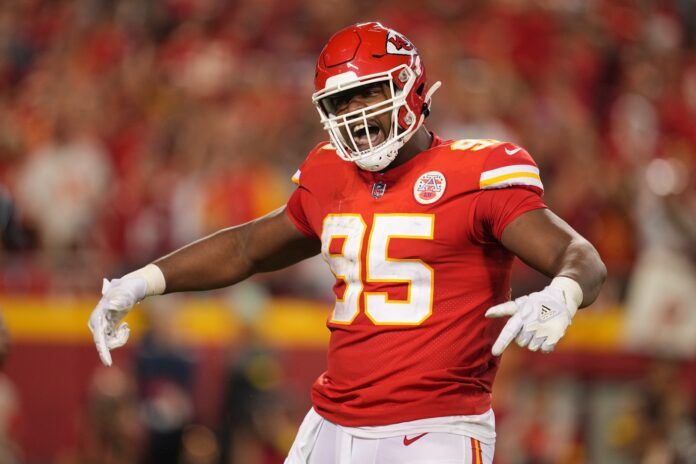Anger, frustration, and disappointment are setting in as the NFL‘s emphasis on protecting quarterbacks is causing consternation with defensive players.
The agitated state of NFL defenses has been triggered by recent controversial roughing-the-passer infractions, including high-profile calls involving Tampa Bay Buccaneers quarterback Tom Brady and Las Vegas Raiders quarterback Derek Carr.
It has reached a point where the officiating is being ridiculed around the league and called soft by many. It’s also being noted as a reaction-overreaction to Miami Dolphins quarterback Tua Tagovailoa’s scary concussion.
NFL Officiating Not Expected To Review Roughing the Passer
Despite all of the public outcry, the status quo is expected to remain in place during the season, at least officially. Roughing the passer is not expected to be reviewed under any proposed instant replay amended rules, according to a league source not authorized to speak publicly.
“It’s absolutely ridiculous what’s going on,” a league source said. “I get protecting the quarterbacks, but this is going way too far. It’s becoming a joke.”
Of course, the NFL, without a formal rule change, can always informally instruct officials to be more judicious about overprotective calls, or they could take their cues from the public reaction. Roughing-the-passer penalties are down 45 percent from last season, with 28 of those penalties through five weeks after 51 through five weeks last year.
Here’s how it reached this point:
First, there was a head-scratching call involving Brady where Atlanta Falcons defensive tackle Grady Jarrett was left in a “lot of disbelief” after being flagged for roughing the passer after sacking the former NFL and Super Bowl MVP in a loss to Tampa Bay.
“Just looking back on it, I’m still kind of left clueless,” Jarrett said in a radio interview. “On what I’m expected to do in that situation.”
Jarrett made the tackle, and referee Jerome Boger said that the veteran defensive lineman shouldn’t have thrown Brady to the ground. It was a highly questionable call that cost the Falcons in a narrow loss, and now there’s an equally or arguably worse one involving Carr and Kansas City Chiefs defensive tackle Chris Jones.
Jones stripped the football away from Carr and was still flagged for unnecessary roughness.
It’s a clear double standard between protection for quarterbacks and defensive players.
“I did see Chris’ sack last night, and that was questionable as well,” Jarrett said. “All these other things that we can review, I’m not saying that it cost us the game, but it cost us an opportunity to win the game. And if it’s costing people games, it’s going to cost people livelihoods. Obviously, this happened to us, the Falcons, but forget all that, it’s about the sport.
“When people watch us to be entertained, to see some game-winning drives, and then when you do it right, the right way, that’s what makes it so frustrating, because you did follow the rules and you didn’t do anything bad. So let’s give the game what the game is owed, and that’s the best product we can put on the field. If it’s going to be a different rule for different players, and this may be, then I feel like you do review some stuff.”
What Happened With Chris Jones’ Penalty?
In a pool report, referee Carl Cheffers said he simply followed the rules when he penalized Jones. On the play, Jones landed on top of Carr and grabbed the football.
Cheffers said he made the call because the defensive lineman allegedly landed on Carr with all of his body weight while the quarterback was in the pocket.
“The quarterback is in the pocket, and he’s in a passing posture,” Cheffers said. “He gets full protection of all the aspects of what we give the quarterback in a passing posture. So, when he was tackled, my ruling was the defender landed on him with full body weight. The quarterback is protected from being tackled with full body weight. My ruling was roughing the passer for that reason.”
What about the football being loose?
“No because he still gets passing protection until he can defend himself,” Cheffers said. “So, with him being in a passing posture and actually attempting to make a pass, he’s going to get full protection until the time when he actually can protect himself. The fact that the ball came out and was subsequently recovered by the defense is not relevant as far as the protection the quarterback gets.
“Just as if he had thrown the ball, he still gets protection. It’s the same here. It’s just a loose ball of another sort, but he would still get protection that is afforded to players in a passing posture. That extends after he’s no longer in control of the ball.”
Cheffers added that he wasn’t micromanaged by the league office.
“New York was not involved in this decision,” he said.
Jones refuted the notion that he landed on Carr with all of his body weight.
And he asked a good question.
“How should I tackle people?” he said. “How should I not roll on him? I’m trying my best. I’m 325 pounds, OK? What do you want me to do? I’m going full speed trying to get the quarterback. They have put such an emphasis on roughing the passer penalties that we’ve got to be able to review it in the booth. That’s the next step.
“Sometimes looks can be deceiving. Now it’s getting absurd. Now it’s costing teams games. I actually stripped the ball and gravity kind of took me to the ground. That’s a roughing the passer call at a critical situation in the game. A lot of these roughing the passer calls would be called back [after video review].”
Former NFL coach Tony Dungy was critical of the calls on social media.
“This is not football anymore,” Dungy wrote. “I know we have to protect the [quarterback,] but Chris Jones was recovering a fumble. We have gotten ridiculous with this.”

